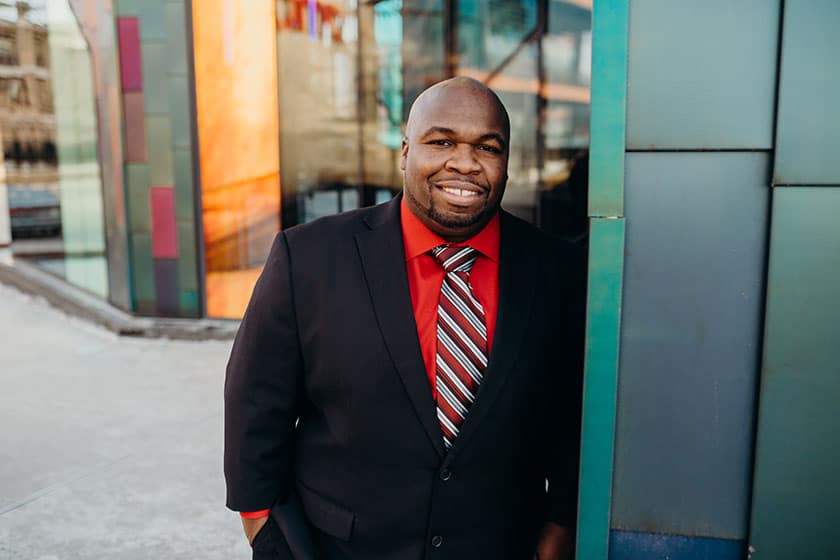Like a lot of folks who enter local politics and get elected mayor of their hometown, the Honorable Jermaine Wilson of Leavenworth, Kansas, started working on his leadership and communication skills when he was barely out of his teens.
But unlike other mayors in America, Wilson began developing those skills when he was a convicted felon serving time in a maximum-security prison.
“My dad had been in prison, my sister was in prison, my brother was in prison, now I'm sitting in prison,” Wilson said recently, recalling his time behind bars. “I realized I have an 8-month-old son who needs his father. If I don't change, he's going to end up following in the same footsteps. He's going to end up going to prison as well.”
Wilson did more than change. In less than a decade, he totally reinvented himself, going from prison inmate to civic leader, criminal justice reform advocate, and father of five. He credits his transformation to God, perseverance, and his family, who inspired him to live a life he once could not have imagined.
Wilson’s children “will never, ever in their life experience poverty the way that I did,” he said.
"They won't be exposed to the criminal lifestyle that I was once exposed to. They are seeing what success looks like. They're seeing what hard work looks like … Because they are seeing something that I was unfamiliar with, it's really giving them hope and giving them an opportunity to figure out which direction they want to go in life." — Jermaine Wilson
Though Wilson's personal journey has taken him far, physically he has always stayed close to Leavenworth. As a young boy, the town’s roughest neighborhoods were all he knew.
He was arrested for the first time at age 12, when he and his brother broke into a house, hoping to steal a stereo. Jermaine stopped to make himself a sandwich. By age 15, he had been convicted of robbery and sentenced to a juvenile facility. After his release 4 years later, he embraced gang life, drug use, and drug dealing, and he adopted a tough-guy persona that won him the respect he craved. But at age 19, he was sentenced to serve 3 years in an adult maximum-security lockup.
That was where Wilson took a hard look at himself and decided to do a U-turn. "I began to sober up, and I really started to reflect over my life," he said. "Once you have a sober mind, you can think clearly. And I saw the pattern."
Wilson seized the opportunities available to him, including enrolling in a program called Prison Fellowship, a nonprofit, Christian organization dedicated to working with inmates. Soon he was taking community college courses, financial literacy classes, leadership training, and—as the father of an infant son—parenting instruction.
But when he was released, his commitment to change was tested. Because of his criminal record, the only job he could get was washing dishes for $8 an hour. He lost a job at a dry cleaner because his mother-in-law, his only source of transportation, got sick and could not take him to work.
"Transportation was a challenge, finding employment was a challenge, and also housing," Wilson said. “It took my pastor to give me the opportunity to find the right housing, which helped me find a stable place for my family."
In time, Wilson worked his way up the economic ladder, establishing basic financial stability. He also volunteered for programs that served other incarcerated people. That community involvement soon led him in unexpected directions.
He was hired by Prison Fellowship, where he now serves as a regional executive. And, surprising even himself, he decided to run for public office, seeking a seat on the Leavenworth City Commission.
“The moment that I put my story out there, some people were open and receptive to it, and some weren't,” Wilson said. “There was this 10 percent that were extremely loud that did not like the fact that a former felon [was running].… But the other 90 percent were open and receptive.”
Wilson turned out to be something of a natural politician, though he says he prefers the term “public servant.” In 2017, he got the most votes among all candidates for City Commission, which led to him being elected mayor. He was reelected to the commission in 2021, again finishing at the top of the ticket.
After a few years as mayor, Wilson says he’s gradually gotten used to the title. "When I hear 'Mayor,' the first thing that comes to my mind is servant-leader," he said. "I don't look at myself as an individual that stands out against other people. Like, no. I'm with you all, I'm serving you all, and I work for you all. It really helps keep me humble."
And Wilson welcomes the opportunity to not only work for his city but also advocate on behalf of others who are looking for a second chance.
"I think it's important that we work to remove government barriers to housing, education, and work. Don't look at people's past mistakes. Look at their qualifications, look at who they are, and see if they're capable of doing the work." — Jermaine Wilson
Wilson added, "A lot of times, we prepare returning citizens for society. But are we really preparing society for returning citizens? I think that's something that we definitely want to do… We all have a part to play in creating a culture of second chance."
To learn more about Mayor Wilson, listen to his interview on the Justice Today podcast:


